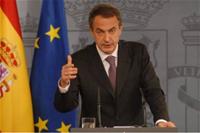Europe is back
euinside, January 4, 2010
N.B. The video starts at the 20th second for reasons euinside has no idea of.
 "Europe is back" - this is how the Spanish prime minister Jose Luis Zapatero defined the four priorities of the Spanish Presidency of the EU, which started on the 1st of January. The first and foremost priority of Madrid would be the economic recovery and the creation of new jobs. To achieve this Spain will work for more economic coordination among member states and will also lay the foundations for a new, more sustainable model for economic growth and to improve the supervision of the financial sector within the EU.
"Europe is back" - this is how the Spanish prime minister Jose Luis Zapatero defined the four priorities of the Spanish Presidency of the EU, which started on the 1st of January. The first and foremost priority of Madrid would be the economic recovery and the creation of new jobs. To achieve this Spain will work for more economic coordination among member states and will also lay the foundations for a new, more sustainable model for economic growth and to improve the supervision of the financial sector within the EU.
The second priority, which Mr. Zapatero introduced in December, would be the implementation of the Lisbon Treaty. Spain will be the first EU member state to preside over the EU with a new institutional treaty which created 2 new strategic positions in the European institutions - the permanent chairman of the European Council Herman van Rompuy who will preside over all EU summits and Lady Catherine Ashton, whose main target would be to make EU's foreign policy look better coordinated. The Spanish Presidency will also work with a new European Parliament whose rights are significantly increased by the Lisbon Treaty.
Nevertheless, national rotational presidencies will keep to a large extent their power because they will continue to chair the field Councils like, for example, the ECOFIN (the Council of the ministers of finance of the EU), the Agriculture Council (the meeting of the agriculture ministers of the EU) etc.
Indeed, the new institutional environment is the reason for the third priority of the Spanish  presidency - the plans for establishment of a European Popular Legislative Initiative. This is an instrument which will give the people a real say in the legislative process of the Union through the Commission.
presidency - the plans for establishment of a European Popular Legislative Initiative. This is an instrument which will give the people a real say in the legislative process of the Union through the Commission.
A lot of interests collects the fourth priority of Spain - to strengthen Europe’s role as a global player in the new multi-polar order, such that it acts as a force for cooperation and progress in the world. The Spanish Presidency will also focus on immigration with the aim to make this problem a strategic priority of Europe. Spain is one of the EU member states that are mostly affected by illegal immigration from Northern Africa.
In the meantime, the definition of the fourth priority gives a clear idea that nevertheless of the entirely new post of high representative for foreign policy, Spain is determined to help the so called EU foreign minister in forming his foreign policy priorities. This is why, Jose Luis Zapatero said in his speech at the European Parliament in the beginning of December, that among his main tasks would be to make additional efforts to consolidate the Union for the Mediterranean as a forum for political dialogue and cooperation between the European Union and the countries of the southern shore.
With regard to the US, according to Mr. Zapatero, the time is right to give greater substance to transatlantic relations. "This is favoured by positive factors such as the greater willingness of the new American government, the Treaty of Lisbon coming into effect, the importance of cooperating with the United States in the current economic and financial crisis".
Likewise in the case of Russia, the European Union must establish a network of agreements which build trust and contribute to better integrating Russia as a constructive and reliable player in the international structure. Out external action would not be credible without a deep and stable relationship with Russia, which naturally includes energy.
Deepening the relations with Russia will not prevent the Spanish presidency from deepening the relations with EU's neighbouring countries, especially those from the Eastern Partnership, as well as the Western Balkans and their future in the EU. In this regard, Madrid will pay special attention to the accession processes which are ongoing, and those are the countries, that have already started accession negotiations with the EU - Croatia, Macedonia and Turkey.
Of course, Spain has not forgotten climate change as a focus in its programme, but the topic is not explicitly presented as one of the priorities of the presidency. In the programme it is only written that Europe should continue to be a leader in the fight against climate change.
 To take over the presidency after Sweden is a big challenge., especially given the fact that Stockholm did quite well with all the 3 of its priorities. However, we should be calm because Spain has a lot of experience in European politics and being a president of the Union will not be its first time. Nevertheless, the risks of a step behind are not to be underestimated, firstly because Spain has serious internal political problems like the wish of the catalonians to claim independence. Second, the country is not the best example of the best EU member state, given the disputable policy of Madrid towards African immigrants and also the European illegal immigrants.
To take over the presidency after Sweden is a big challenge., especially given the fact that Stockholm did quite well with all the 3 of its priorities. However, we should be calm because Spain has a lot of experience in European politics and being a president of the Union will not be its first time. Nevertheless, the risks of a step behind are not to be underestimated, firstly because Spain has serious internal political problems like the wish of the catalonians to claim independence. Second, the country is not the best example of the best EU member state, given the disputable policy of Madrid towards African immigrants and also the European illegal immigrants.
To put it in other words, the next 6 months will be quite interesting because they will show whether the Union will go forward to a further integration or just the opposite.